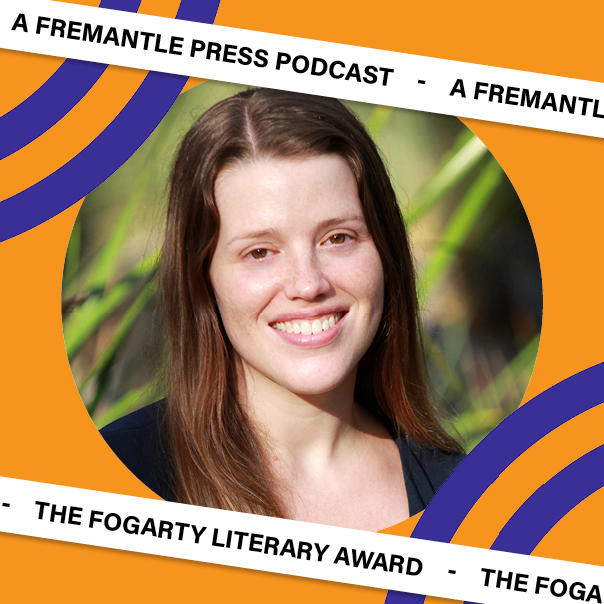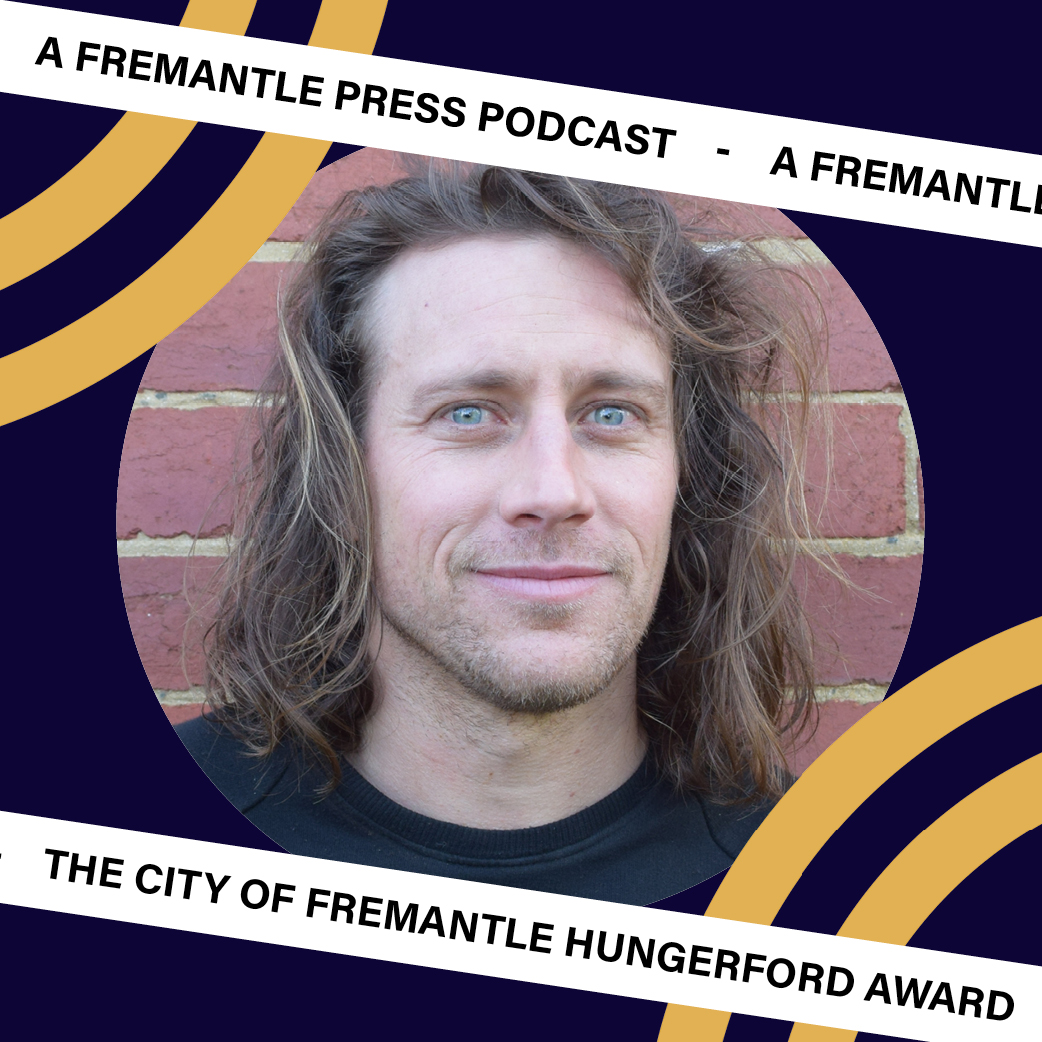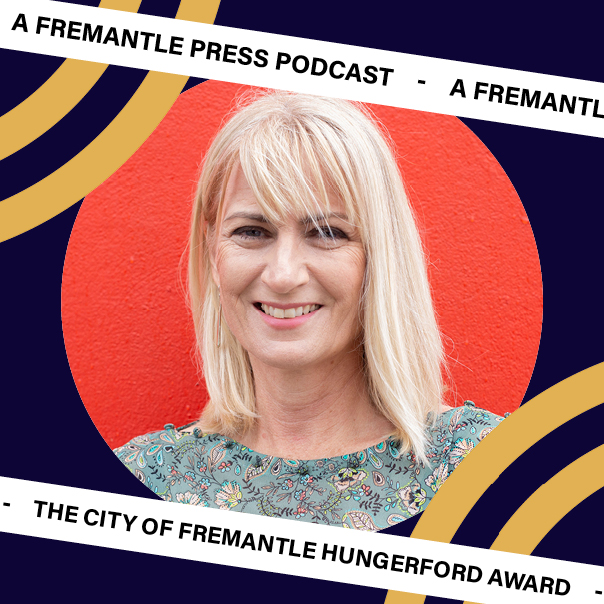Episode Transcript
[00:00:13] Speaker A: Hello and welcome to the Fremantle Press podcast. Today we are recording on Wali Lap in Wajak Noongar Buja, and I'd like to acknowledge our first storytellers along with noongar elders past, present.
My name is Claire Miller and I'm here with fiction publisher Georgia Richter to introduce you to one of four writers shortlisted for the 2024 City of Fremantle Hungerford award. Hello Georgia.
[00:00:39] Speaker B: Hi Clare. Isn't it a great shortlist this year? I'm so enjoying meeting the writers.
[00:00:44] Speaker A: I'm loving it. And today's guest is Fiona Wilkes, whose manuscript is a work of historical fiction called I remember everything. So what was it that brought this manuscript to the top of your list?
[00:00:56] Speaker B: It's funny, Clare, because what brought this one to my attention was in fact a kind of a trick in that I believed that this novel was a memoir and that it had been written by someone who was about my age. But in fact it is a novel and it just feels so real and authentic and of a particular erade. I think its strengths are its many characters whose daily dramas really create the enduring themes that run throughout the novel, which are about the power of friendship and of love.
I remember everything is a moving, keenly felt account of an era and also of a virus that changed the world forever.
[00:01:38] Speaker A: I think it has so much resonance for today, even though its historical fiction. So I'm really interested to read the rest of it.
[00:01:46] Speaker B: Absolutely.
[00:01:47] Speaker A: Now, Fiona Wilkes is a current PhD candidate at the University of Western Australia, specialising in English and literary studies, and her creative work has been selected for a range of local, national and international publications. They include Westerly magazine, Coffin Bell Journal, the Elevation Review, Leon Literary Review and Lilly Poetry Review. Now, she was a featured writer at the 2022 National Young Writers Festival and was nominated for the Pushcart Prize in 2023. She was also shortlisted in 2023 for the Jacob Zilba Prize for short fiction and was highly commended for the 2023 Catherine Susannah Pritchard short fiction prize. Fiona, congratulations and welcome to the podcast.
[00:02:34] Speaker C: Thank you.
[00:02:35] Speaker A: You've been shortlisted for a number of prizes. What does it feel like to now make the Hungerford shortlist as well?
[00:02:41] Speaker C: It really means the world to me, especially because it's recognition of my first novel length piece of work. I've been working on it for what feels like a really long time, so to have someone read the full thing and actually like it is an incredible feeling.
It's especially special because so much of what's in the manuscript touches on themes or events that feel personal or at least really important. To me, the fact that such an unapologetically queer story has made the shortlist in itself really meaningful to me. But the fact that it came from my brain is almost unbelievable.
[00:03:13] Speaker A: And so, tell us more about the manuscript.
[00:03:16] Speaker C: Sure. So the story begins in the UK in 2020 with my main character, Billie, sitting down to write her memoirs. Her memories take her back to 1979, when she and her childhood best friend Laura are preparing to move to Bristol to attend university.
There they meet a group of fellow queer folk who become their close friends and they spend several years living their lives, falling in and out of love, going dancing and doing kind of copious amounts of drinking and drug taking.
It was important to me to show some years of queer joy and fun that's almost untainted by homophobia and the dangers of the mid to late 1980s.
So in 1983, Billie and some of her friends moved to London to begin their adult lives. She gets a job at a magazine that she doesn't particularly like, but she has intentions to become a novelist, so she figures that it will do until she finishes her book. However, before Billy can follow these dreams, tragedy strikes and one of her friends, Ted, becomes mysteriously ill and does not get better. So hes the first of the group to contract HIV and to die of AIDS. Hes followed by almost every other member of the group apart from Billy, who takes it upon herself to nurse her friends until they pass away, which they almost all eventually do.
[00:04:27] Speaker A: Why did you title the novel? I remember everything.
[00:04:31] Speaker C: This is a phrase thats repeated in the novel. So when she and her friends are in the throes of joy, they want to cling to every memory and hold onto it forever. And when they become sick, Billy knows that she should try and remember everything for the sake of posterity, but finds it really painful to do so. Memories are something that are both essential to Billie and something that she struggles to deal with. And I think this is something that queer folk in a sort of post Aids world can really relate to. It can be difficult to deal with inherited memories and trauma from the eighties and nineties. We're aware of what happened, but there is like this inbuilt fear and anxiety that it could happen again. Yet we also seem to try our best to ignore it. This was something I was really conscious of when writing the manuscript, so I wanted to make sure that the story began and ended with memory.
[00:05:18] Speaker A: I thought it was an extremely amazing and a beautiful evocation of that era. It was really, really lovely. We've asked you to read something from the manuscript. What is it? That you're going to read for us.
[00:05:31] Speaker C: So this is from the beginning of the novel, where we're really just kind of meeting Billy and Laura.
The two of us had spent almost every evening out on the hill that summer carving out a million mythologies of our girlhood. It watched over our town, and we loved the way the lights of everybody's houses winked on one by one as the sun set and violet darkness descended over them. When two lights snapped on at the exact same time, we would shriek with excitement and then descend into fits of giggles. We had both been accepted at the University of Bristol. I was to read english literature, Laura to study fine art. Have you started packing yet? I asked. Laura stifled a yawn, leaning back on her elbows and frowning at the yellow grass sticking to her skin. Finished already? It was only Wednesday. We weren't due to drive to Bristol until the following Sunday, ahead of freshers week. She shrugged, brushing the grass away off of herself. I can't wait to be shot of this place. I want my life to start. I snorted. What have you been doing so far? She shot me a devilish glance. It made my chest tighten. I want to leave Brighton early on Sunday, so be ready. We can't. We have to leave after lunch. Why? I have church. Laura groaned as dramatically as she could and rolled halfway down the hill. I shouted after her. I promised my mother it'll be the last time till Christmas. Fine. She clambered back towards me. But the minute you've supped up the last of your mums God awful gravy at Sunday lunch, we are out of here. She let herself fall against me, the bones of our shoulders clicking. Her hair brushed against my cheek. She smelled like shampoo and summer grass and sun cream forever.
We planned out our whole lives on that hill, from our earliest adolescence to now. In the past, when we talked about what the future would look like, we were idealistic and superficial. We'd paint the living room walls purple. We'd smoke cigarettes and go to Venice. We'd get married and wear poofy white dresses and smear sickly sweet cake over our new husband's doubly chins.
At the heart of each of these preemptive mythologies was the fact that we would not, under any circumstances, be staying in Suffolk. The details of our plans had faded after we entered our teenage years and both realized that we had no interest in husbands or marriage in general. But running away had remained our most consistent dream.
Laura had terrified me by coming out when we were 14. She had opened her mouth, but it was my truths that came tumbling out. I had played it cool, which was not something I had ever successfully done when it came to Laura before, and told her not to worry, that we could still be friends. She had rolled her eyes, shoved me, and told me that she had never been worried about that.
For two years, I listened to Laura Whisper stories about girls in our year who she had kissed, or had kissed her because they had heard a rumor. She was an experiment for nearly every girl we knew and a challenge for every boy. Each of her experiences left me further and further behind, and I could share none of my own with her. Finally, the day after my father's funeral, as we lay curled up under my childhood duvet, sipping pineapple Cresta, I came out to her. That was when our plan shifted. When we went to university, we promised one another our lives would begin properly. Laura constantly told me just how sick she was of her nice, normal life. She wanted adventures and dancing and lovers. I just wanted her.
[00:09:00] Speaker B: Fiona, thanks so much for that reading. It's just beautiful hearing those words come alive in your voice, you know, with the rhythm and everything that you intend. And one of the things I really loved about this manuscript was the tension that exists between Billy and Laura throughout this desire that exists inexpressed between two best friends. And it's a really nice thread that runs through the novel.
I wonder how you went about immersing yourself into 1979. Since when I read this manuscript, I just fully took it as an expression of lived experience.
[00:09:41] Speaker C: Well, I wouldn't say I set out to write a memoir by any means, but it was important to me to make it feel like my character was reflecting on a life already lived. And I wanted to make sure I made the moments of her life that she's sharing feel as vivid and real as I could make them. So, obviously, I was not there in 1979, but I tried my best to write the story as if I was Billy, remembering all of these things. So I tried to focus on the little things that often stick in the mind when we're thinking through our memories. It might be the way that something smells, or the way a person's hand felt in ours, or the sound of a laugh. It's a cliche, maybe, but I really do think that it's a the little things that make up a life. So I tried to be intentional about including them in the work.
In terms of researching the work, I approached the novel the same way I would approach my academic work, by reading non fiction books and memoirs by folk that had lived through that time. Period. And looking into the facts and figures and wherever possible, finding firsthand accounts about the AIDS crisis. The key, I think, is that although I never experienced the AIDS crisis, I have experienced a lot of the other things that are in the work. So I'm queer. I've experienced heartbreak, grief coming out, but also really fun and beautiful things like finding my chosen family, going to university far from home, falling in and out of love. It's all in there, and it's all really. It all really happened, if not necessarily in the way I describe it in the manuscript. So I had to research the situation and the circumstances, but I could write from life for a lot of what goes into the manuscript, so hopefully that makes it feel a bit real.
[00:11:15] Speaker B: Absolutely. I think that detail makes it granular and so real. Was there anything in your research that surprised you or that that was unexpected?
[00:11:28] Speaker C: In some ways, I think what really stood out to me was the fact that homophobia we so often kind of assign or think of as being a hate crime. We see it very vividly, but so much of what happened was subtle, and it wasn't necessarily hateful, but it was hurtful. So certain laws that were still in place, kind of the way that people would react to one another, it all just made me kind of incredibly sad.
And obviously, this book is set in the UK, but I found out that actually, in Perth, homosexuality wasn't decriminalized until 1989, not so long ago. And I found that really surprising, but in some ways, not that surprising, given kind of the world we live in today.
[00:12:20] Speaker B: I think another thing that I enjoyed, and it feeds into that is the spectrum of queer characters that you had, too. So everyone has a different story. They're all bonded. And as you also used the words earlier, found family. They do become a found family. But I think you give us so many windows into different kinds of lives and expressions of queer living, and that was just beautiful. Thank you, Fiona, thank you so much for sharing your thoughts with us. Is there anything else that you would like to add?
[00:12:54] Speaker C: Yeah. Thank you guys so much for having me. I just really like to encourage anybody listening to seek out queer stories wherever you can and to amplify queer voices as much as possible. There seems to be a lot of silencing going on out there, and I think it's our responsibility to resist that, even in small ways. So thank you.
[00:13:11] Speaker B: What a beautiful message to leave us with. Thank you, Fiona.
[00:13:15] Speaker A: Fiona, best of luck with your writing and with the award. We've been hearing from Fiona Wilkes, who is shortlisted for the 2024 City of Fremantle Hungerford Award to discover whether Fiona wins, we'd love to have you join us at the ceremony, which takes place at Fremantle Arts Centre on Thursday the 24 October. I'll be there, as will a who's who of the western australian literary community. Tickets are free and available now from the Fremantle Press website.


